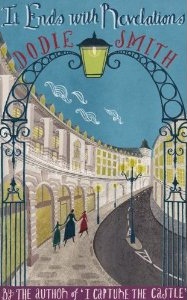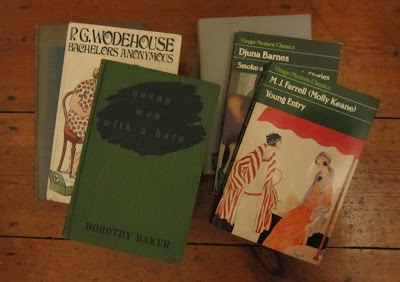As I say, ICB - sorry, Dame ICB - is the reason I bought this book. Maybe only one fifth of people who try Ivy end up liking her, but that one fifth will be passionately pro. And she came across pretty much as I imagined she would from her writing and from photographs - formidable, amusing, confident, rather intimidating. I think all of that comes across in this response:
What question do you most dislike people asking you about your work?If I was hoping to learn a lot about her writing process, I was rather out of luck. The interview is mostly about her thoughts on religion, families, even her characters - but not really about how she creates them. And the big question that everyone must ask when they encounter ICB - why so much dialogue? - is sadly one which she cannot answer herself:
[...] 'Do you find other people's conversation useful?' I went to a cocktail party the other day, and some woman I was talking to said, "Mustn't this be useful to you?" Of course it wasn't useful. Whatever good would it be to put down, "Do you feel that draught?", and "Are you sure you won't have another sandwich?"? Conceit, because the don't say a thing that would be any good at all. One would be only too glad to take it down if one heard something deep or revealing or interesting. Certainly not at a cocktail party, which is a dreadful function in itself. I can't bear them. I went to this one because it was given by the landlord. We're frightfully friendly. That is to say he's frightfully friendly to me. I believe it's because of the enormous rent I pay him. He rather likes my fame, but he thinks of the rent much more.
I don't know why I write so much in dialogue. I think it must just have been my nature. It just came like that. I don't think one can explain these things - they probably go deep, these reasons, don't you think?So, there you go. Was she being disingenuous? Hard to say. There is an air throughout that ICB is slightly above these sorts of discussions, or that she feels distanced from them somehow. Perhaps that's just her no-nonsense personality, and that isn't to say she doesn't give her views firmly. I liked what she had to say about accusations that her novels were old-fashioned (I'm going to keep quoting quite a lot from these ladies, because the whole point of Ivy & Stevie is that it focuses on the authors' voices. That, and typing out quotations takes less energy than forming my own sentences!)
I know you get very annoyed, don't you, when people say that you write about a world that is no longer there, because, as you say, human beings are always there.Stevie Smith says something quite similar in her interview:
Oh, I think the world will always be there. It is true I put my books back, because the kind of world one knows one doesn't know completely until it's finished. In a sense one has to wait until it's finished. Things are so much in a state of flux now. I think that some of these modern books that depict human life with people just roaming about London and living in rooms and sleeping with everybody - it's not interesting, because, of course, I can't read them. Everybody doesn't live like that, do they? [...] They live in civilized houses as they always did. They have servants as they always did, although fewer. Supposing I were living fifty years ago, situated as I am, I should have had a house and a cook and a housemaid, and, I suppose, a pony trap and a stable boy, instead of just a flat and one factotum. But that's a superficial difference. I don't think people do alter - if they do, they react back again, don't they? There must be family life.
What do you think of the world today?Well said, Stevie! I think the difference between question and answer here can be attributed to the difference between journalist and novelist. Not that Dick was a journalist (she was an erstwhile novelist herself) but she takes that stance for these interviews. The journalist focuses on change, and everything being new in the present moment; the novelist (especially one as perceptive as ICB) looks at that which stays the same; the consistencies of human nature throughout the generations.
Well, much the same as I always thought of it yesterday. It doesn't change very much does it?
When I say that I bought Ivy & Stevie because of Ivy, I don't imply any distaste for Stevie. I just haven't read anything by her - except for 'Not Waving But Drowning' - although I do have a novel or two of hers on my shelf. Having now read the interview with her, she comes across as a charming, modest, slightly scatty woman - qualities which make me rather love her. She lived with her aunt for a long time, who obviously took scant interest in Smith's writing, and she describes it wonderfully (I think there is something in the expression 'my dear' which will always win my support):
What did you aunt think of your work?Being unfamiliar with her work, I couldn't really relate it to what she said. My main knowledge of Stevie Smith comes from Kathryn Williams' song 'Stevie', from the album Leave to Remain. I can't find a version online to imbed, but it includes the line 'They say she's obsessed with death and that / but what else do you laugh at?' Which prepared me for Stevie Smith saying something like this:
Oh, her attitude was simply splendid, everything one asks for really. I should hate to live with a literary aunt. My aunt used to say, "I'm very glad to hear you've got another book coming out, but as you know I don't know much about it. It's all nonsense to me, my dear." I felt this was the right attitude. My aunt had a faintly sardonic attitude, I think, to the whole world. Her highest praise was when, after I got the Cholmondeley Award, she said, "I wish your mother was alive and could have known about this dear."
There's a terrible lot of fear of life in my poems. I love life. I adore it, but only because I keep myself well on the edge. I wouldn't commit myself to anything. I can always get out if I want to. I think this is a terribly cowardly attitude to life. I'm very ashamed of it, but there it is, dear. I love death, I think it's the most exciting thing. As one gets older one gets into this - well, it's like a race, before you get to the waterfall, when you feel the water slowly getting quicker and quicker, and you can't get out, and all you want to do it get to the waterfall and over the edge. How exciting it is!So I came away with a new fondness for Smith, and determination to read her writing, and a renewed admiration for (and slight fear of) Dame Ivy. As for Kay Dick herself, I rather enjoyed her brief reflections upon knowing both writers. Neither sticks in my mind particularly, but the personal touch was valuable. I thought I knew Kay Dick's name from somewhere, but can't track down where... I Googled her and read an obituary which I wish I hadn't, as it was incredibly vicious (and provoked letters giving opposing views.) Well, whatever else Dick was or wasn't, did or didn't do, I am grateful that she preserved these conversations, which could only take place with an interviewer with whom the authors felt comfortable. An invaluable resource for anyone interested in either of these writers - or, indeed, in the lives of writers in general.





.JPG)





















